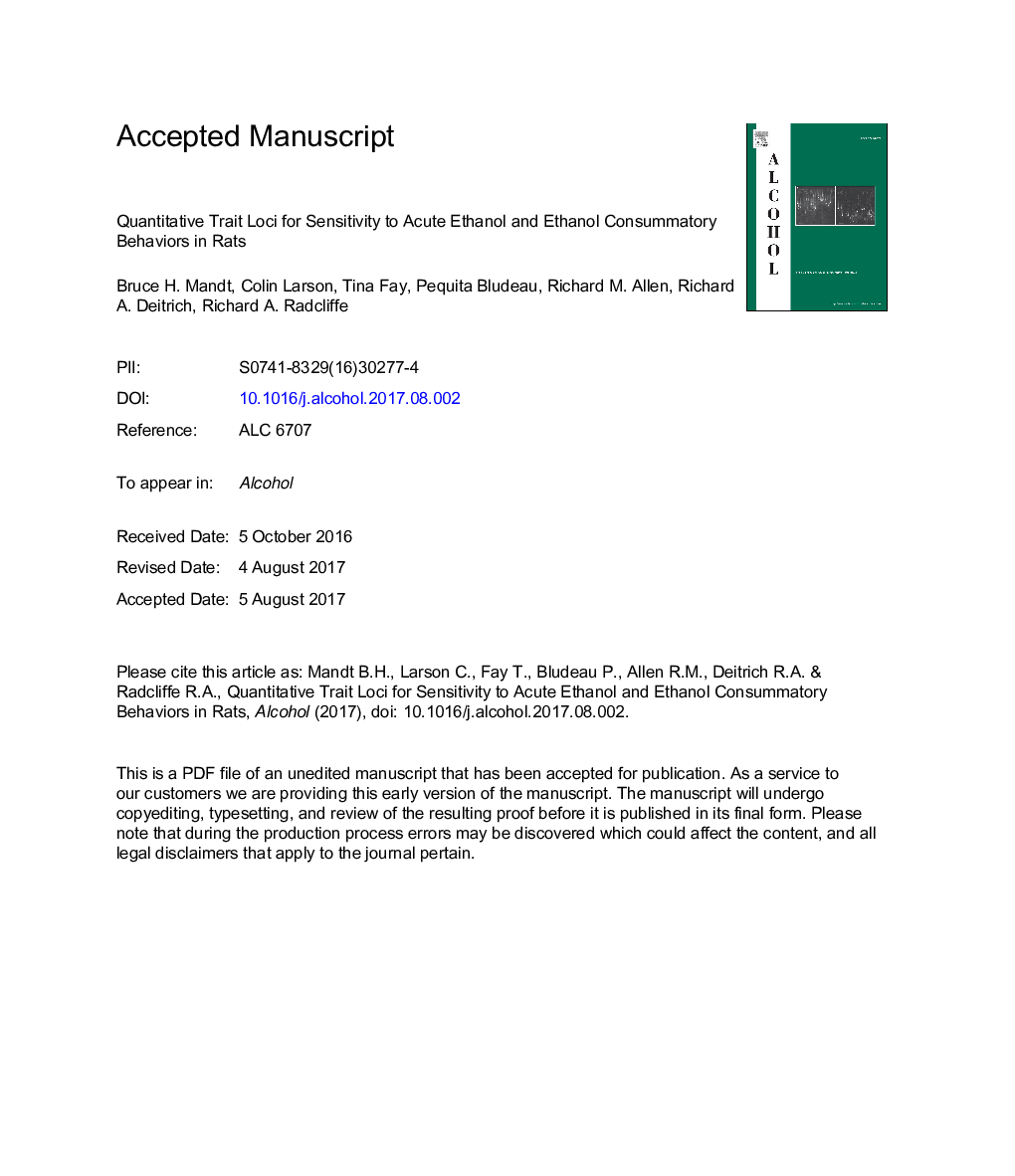| کد مقاله | کد نشریه | سال انتشار | مقاله انگلیسی | نسخه تمام متن |
|---|---|---|---|---|
| 7501523 | 1485963 | 2018 | 47 صفحه PDF | دانلود رایگان |
عنوان انگلیسی مقاله ISI
Quantitative trait loci for sensitivity to acute ethanol and ethanol consummatory behaviors in rats
ترجمه فارسی عنوان
لک های کمی برای حساسیت به رفتارهای اتانول حاد و اتانولی در موش صحرایی
دانلود مقاله + سفارش ترجمه
دانلود مقاله ISI انگلیسی
رایگان برای ایرانیان
کلمات کلیدی
موضوعات مرتبط
علوم زیستی و بیوفناوری
بیوشیمی، ژنتیک و زیست شناسی مولکولی
زیست شیمی
چکیده انگلیسی
Individuals with a low initial response to alcohol (i.e., ethanol) are at greater risk of developing alcohol abuse or dependence later in life. Similar to humans, individual differences in ethanol sensitivity also can be seen in rats, and several laboratories have used these individual differences to generate selectively bred rats that differ in acute ethanol sensitivity. We have worked with two sets of such rats (Inbred High or Low Alcohol Sensitivity strains, IHAS or ILAS, respectively; Inbred Alcohol Tolerant or Non-Tolerant strains, IAT and IANT, respectively) and have confirmed previously mapped quantitative trait loci (QTL) for these acute differences with the use of recombinant congenic lines; however, the relationship between acute sensitivity and ethanol drinking in these rats has yet to be determined. Thus, here we tested the hypothesis that QTLs underlying variation in initial low sensitivity to ethanol also will modulate variation in ethanol drinking behaviors. Separate groups of selectively inbred parent and congenic rats were tested for the loss of righting response (LORR) and also assessed for ethanol consummatory behavior using either operant self-administration or an intermittent-access two-bottle choice procedure. LORR testing confirmed the presence of a LORR duration QTL in all of the congenics; however, the lack of a corresponding difference in blood ethanol concentration at the regaining of the righting response suggests that these QTLs may be mediating a difference in ethanol metabolism rather than in neuronal sensitivity. IHAS/ILAS-derived congenic rats did not differ from parent rats at any point during operant self-administration. IAT/IANT-derived congenic rats showed small, but significant, increases in ethanol consumption relative to the parent strains only during the initial stages of operant self-administration. In contrast to operant testing, IHAS/ILAS-derived congenic rats showed significantly greater ethanol consumption and preference than parent rats during intermittent-access testing. There were not differences, however, between IAT/IANT congenic and parent rats during intermittent access. These data support the hypothesis that there is a genetic relationship between initial ethanol sensitivity and ethanol consumption, at least for the IHAS/ILAS-derived congenic rats. Our current studies, however, cannot eliminate pharmacokinetic or taste preference factors as contributing to the rats' responses, nor can we eliminate the possibility of a linkage effect because of the fairly large size of the QTL intervals; i.e., distinct genes may be mediating the acute sensitivity and drinking responses.
ناشر
Database: Elsevier - ScienceDirect (ساینس دایرکت)
Journal: Alcohol - Volume 66, February 2018, Pages 55-67
Journal: Alcohol - Volume 66, February 2018, Pages 55-67
نویسندگان
Bruce H. Mandt, Colin Larson, Tina Fay, Pequita Bludeau, Richard M. Allen, Richard A. Deitrich, Richard A. Radcliffe,
